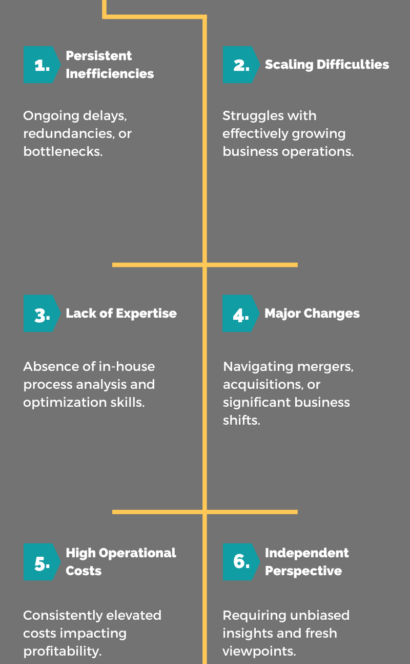Unlocking the Power of Business Process Consulting
Business process consulting is all about making your business better. Companies turn to this service to boost efficiency, cut costs, and drive transformation. At its core, business process consulting helps you examine how you operate and find the best ways to improve.
Quick facts to improve your business operations with business process consulting:
- Identifies inefficient processes
- Streamlines operations for better productivity
- Helps adapt to market changes
- Incorporates technology to optimize work
Hello, I’m Russell Rosario, co-founder of Profit Leap. I have extensive experience as a fractional Chief Financial Officer (CFO), Certified Public Accountant (CPA), and Software Engineer. I am here to help you navigate the complexities of business process consulting to transform your business.

By understanding the nuances of business process consulting, we can uncover ways to make your business more efficient and primed for transformation.
Now, let’s dive deeper into what business process consulting entails and how it can benefit your business.
Understanding Business Process Consulting
Business process consulting is all about making your business run better. Imagine having a team of experts come in, look at how you do things, and then help you improve those processes. The main goals are to cut costs, increase profits, and enhance the experience for both your staff and customers.
Definition
Business process consulting involves analyzing, streamlining, and transforming the way your company operates. It can range from simple tweaks to a complete overhaul of your business processes. Consultants use various techniques and tools to identify inefficiencies and recommend improvements.
Goals
The primary goals of business process consulting are:
- Reduce Costs: By eliminating wasteful steps and optimizing resources.
- Increase Profits: Through more efficient operations and better customer experiences.
- Enhance Customer Experience: By making interactions smoother and more satisfying.
Front Office Transformation
Front office transformation is crucial. There are two main components to focus on:
Digital Front Office
A digital front office means interacting with customers online. This could be through a website, mobile app, or social media. Customers want to do business at their convenience, not just during your office hours. By going digital, you can engage with them 24/7 and improve retention.
Globally Integrated Enterprise
This involves rethinking your internal operations to support a digital front office. The goal is to be lean, agile, and fully integrated. This makes it easier to adapt to market changes and customer demands without losing focus on your core business vision.
Key Process Redesign
Transforming your business often requires redesigning key processes. This can be challenging, but it’s essential for staying competitive.
Strategic Planning
Consultants gather detailed information about your current operations and goals. They use planning software to identify strengths and weaknesses. Together, you’ll develop a strategic plan to address these issues.
Streamlining
The aim is to make your business leaner and more agile. This involves removing redundant steps, cutting through red tape, and integrating your processes. Technology plays a big role here, freeing up employees to focus on what they do best.
Outsourcing
Knowing when and what to outsource is crucial. Some tasks require specialized knowledge that your team may not have. Outsourcing these tasks allows your team to focus on core activities.
For example, a healthcare institution might outsource its IT infrastructure management to experts, allowing its staff to concentrate on patient care.
Roles and Responsibilities in Business Process Consulting
Business Process Improvement Consultant
A Business Process Improvement Consultant focuses on making your business operations faster, leaner, and more efficient. They use automation and streamlining techniques to cut down on wasted time and resources.
Key Responsibilities:
- Automation: Implementing tools and technologies to automate repetitive tasks. For instance, a consultant might introduce software that automates data entry, freeing up employees for more valuable work.
- Streamlining: Identifying and removing bottlenecks in workflows. By mapping out current processes, they can pinpoint inefficiencies and suggest improvements.
- Efficiency: Ensuring that all processes contribute effectively to the organization’s goals. This might involve revising roles and responsibilities to better align with strategic objectives.
Industry Process Consultant
An Industry Process Consultant brings specialized knowledge tailored to a specific sector. They are experts in their field and understand the unique challenges and opportunities within that industry.
Key Responsibilities:
- Technical Mastery: Leveraging deep industry knowledge to provide targeted solutions. For example, in the healthcare sector, they might focus on improving patient data management systems.
- Content Creation: Developing materials and resources that help educate and inform stakeholders about new processes or technologies.
- Livestreaming: Using modern communication tools to engage with teams across different locations. This can be particularly useful for training sessions or real-time updates on project progress.
Business Process Expert
A Business Process Expert dives deep into data to develop actionable solutions. They focus on data analysis, solution development, and recommendations to drive business improvements.
Key Responsibilities:
- Data Analysis: Collecting and analyzing data to understand current performance and identify areas for improvement. This might involve using process mining tools to track where delays and errors occur.
- Solution Development: Creating tailored strategies to address identified issues. These solutions are often data-driven and backed by quantitative results.
- Recommendations: Providing actionable advice to stakeholders. For example, they might suggest adopting a new software tool or revising a workflow to eliminate redundancies.
By understanding these roles and responsibilities in business process consulting, you can better appreciate how these experts contribute to making your business more efficient and adaptable. Next, we’ll explore the core methodologies used in business process consulting.
Core Methodologies in Business Process Consulting
To improve business operations, consultants use various methodologies. Here are some of the most common ones:
Lean Six Sigma
Lean Six Sigma combines two powerful methods: Lean and Six Sigma. Lean focuses on eliminating waste — anything that doesn’t add value to the customer. Six Sigma aims to reduce variability and defects. Imagine if every time you ordered a coffee, it tasted exactly the same — that’s Six Sigma in action. Together, these methods help businesses streamline processes and improve quality.
CMMI
Capability Maturity Model Integration (CMMI) is a framework that helps organizations improve their processes. It has maturity levels that range from “Initial” (where processes are unpredictable) to “Optimizing” (where processes are continuously improved). By following CMMI guidelines, companies can systematically enhance their capabilities and achieve higher performance levels.
Agile
Agile is a flexible and iterative approach initially developed for software development but now used in various industries. Agile methodologies, like Scrum and Kanban, focus on delivering small, incremental changes rather than large, infrequent updates. This allows businesses to adapt quickly to changes and continuously improve their processes.
DevOps
DevOps is a set of practices that combines software development (Dev) and IT operations (Ops). The goal is to shorten the development lifecycle and provide continuous delivery of high-quality software. DevOps practices, such as continuous integration and continuous deployment (CI/CD), help businesses respond more rapidly to customer needs and market changes.
ITIL 4 Foundation
ITIL 4 Foundation stands for Information Technology Infrastructure Library. It’s a set of best practices for IT service management that focuses on aligning IT services with business needs. ITIL 4 helps organizations manage risk, strengthen customer relations, and establish cost-effective practices. It’s particularly useful for businesses looking to improve their IT service delivery and management.
By understanding these core methodologies in business process consulting, you can better appreciate how these experts contribute to making your business more efficient and adaptable. Next, we’ll explore the benefits of engaging in business process consulting.
Benefits of Engaging in Business Process Consulting
Cost Reduction
One of the most compelling reasons to engage in business process consulting is the potential for significant cost reduction. Consultants identify inefficiencies in your current processes and recommend solutions to eliminate waste. For example, they might discover that automating certain routine tasks can save both time and labor costs.
Fact: According to PwC, optimizing processes can lead to decreased process costs, improving your bottom line.
Profit Increase
With reduced costs, your business naturally sees an increase in profit. However, profit increase isn’t solely about cutting expenses. Business process consultants also help you identify new revenue streams and optimize existing ones. They streamline operations to make your business more agile and competitive, leading to better market positioning and higher sales.
Case Study: A retail company worked with a business process consultant to optimize their supply chain management. The result? A 15% increase in annual profits due to reduced inventory costs and faster delivery times.
Enhanced Customer Experience
Customer satisfaction is crucial for any business. Business process consultants focus on improving the customer journey by streamlining processes that directly impact customer interactions. Whether it’s faster response times, more accurate billing, or better product availability, enhanced processes lead to happier customers.
Quote: “A clear, concise, and accurate billing process is not just a procedural necessity but a demonstration of professionalism and respect for the customer’s time and money,” as highlighted in Profit Leap’s blog.
Real-Time Adjustment
The business environment is always changing. One of the key benefits of business process consulting is the ability to make real-time adjustments. Consultants use sophisticated tools to monitor and tweak processes as needed, ensuring that your business can adapt quickly to market changes.
Example: Imagine a sudden shift in market demand. With real-time data and process monitoring, you can adjust your production schedules immediately, avoiding overproduction or stockouts.
By engaging in business process consulting, you not only streamline your operations but also position your business for sustainable growth. Next, we’ll delve into how business process consulting can be implemented across various industries.
Implementing Business Process Consulting in Various Industries
Business process consulting is versatile and can be tailored to meet the unique needs of various industries. Here’s how different sectors can benefit from business process consulting:
Government
Government organizations often face challenges like policy compliance, limited budgets, and IT infrastructure needs. Business process consulting helps by focusing on change management to ensure that government workers understand, accept, and support changes.
Example: A government agency may utilize compliance documentation procedures to meet regulatory requirements efficiently. This ensures smoother operations without overspending.
Aerospace
The aerospace industry is highly competitive and requires efficient product development cycles and effective supply chain management. Business process consultants can help reduce defects and rework, manage product obsolescence, and enhance customer satisfaction.
Case Study: An aerospace company implemented Lean Six Sigma to improve its product development cycle, reducing time-to-market by 30% and cutting costs by 15%.
Health Care
Health care institutions can benefit immensely from automation tools and strategic financing strategies. Consultants help simplify filing and documentation through advanced healthcare software, improving operational efficiency.
Example: A hospital used business process consulting to automate its patient record-keeping system, resulting in a 50% reduction in administrative workload and faster patient service.
Retail
Retailers deal with rapid changes in consumer tastes and operational challenges like inventory control and supply chain management. Business process consultants help implement systems that improve inventory accuracy and streamline order processes.
Case Study: HelloFresh used business intelligence to automate its reporting processes, saving 10 to 20 working hours per day for its digital marketing team.
Utilities
Utility providers face changes in sectors like renewable energy and oil and gas markets. Consultants help define business models, improve customer service, and refine management strategies.
Example: A utility company used business process consulting to optimize its fuel sourcing processes, leading to a 20% cost reduction and improved service reliability.
Finance
Financial institutions need secure data management, regulatory compliance, and effective risk mitigation strategies. Business process consultants help create robust systems to manage these needs efficiently.
Case Study: Charles Schwab uses business intelligence to monitor performance across its branches, optimizing operations and improving customer service.
Information Technology
The IT sector is ever-changing, requiring scalable operations models and better customer responsiveness. Consultants help create realistic models, lower rework rates, and manage resources tactically.
Example: An IT company implemented business process improvements to enhance its scalability, resulting in a 25% increase in project delivery speed and higher customer satisfaction.
By implementing business process consulting tailored to each industry, organizations can achieve operational excellence, meet regulatory requirements, and adapt to market changes efficiently. Next, we’ll explore some frequently asked questions about business process consulting.
Frequently Asked Questions about Business Process Consulting
How much does a business process consultant earn in the US?
The earnings of a business process consultant in the US can vary widely based on experience, location, and industry. On average, a business process consultant can expect to earn between $70,000 to $120,000 per year. Entry-level positions might start around $50,000, while seasoned professionals with specialized skills can earn upwards of $150,000 annually.
What does a business process improvement consultant do?
A business process improvement consultant focuses on enhancing the efficiency and effectiveness of a company’s operations. They analyze current processes, identify bottlenecks and inefficiencies, and recommend solutions to streamline operations. Their work involves:
- Conducting Interviews and Surveys: Gathering insights directly from employees and stakeholders.
- Data Mining: Using tools to collect and analyze process data.
- Developing Solutions: Proposing changes like automation, process re-engineering, or new technology implementations.
- Implementation and Monitoring: Ensuring the recommended changes are adopted and tracking their impact on performance.
Example: A retail company struggling with inventory management hired a business process improvement consultant. The consultant identified redundant steps in the supply chain and implemented an automated inventory tracking system, reducing stockouts by 30% and increasing customer satisfaction.
What does an industry process consultant do?
An industry process consultant specializes in optimizing processes within a specific industry. They bring deep technical knowledge and industry-specific insights to address unique challenges. Their responsibilities include:
- Technical Mastery: Understanding and applying industry-specific standards and best practices.
- Content Creation: Developing documentation, training materials, and process maps tailored to the industry.
- Livestreaming and Workshops: Conducting training sessions and workshops to ensure stakeholders understand and adopt new processes.
Example: In the aerospace industry, an industry process consultant helped a manufacturer streamline its product development cycle. By introducing Lean Six Sigma methodologies, they reduced development time by 15%, leading to faster time-to-market for new products.
By addressing these common questions, you can better understand the roles, responsibilities, and value of business process consultants. This knowledge can help you make informed decisions when considering consulting services for your organization.
Conclusion
As we wrap up our exploration of business process consulting, it’s clear that optimizing your operations is key to staying competitive. At Profit Leap, we understand the transformative power of effective processes, and we’re here to guide you every step of the way.
One of our standout offerings is Huxley, our AI business advisor. Huxley is more than just a tool; it’s your business’s co-pilot. By leveraging advanced AI capabilities, Huxley provides tailored advice, precise forecasting, and actionable insights, all designed to evolve as your business grows. This ensures that you are not just reacting to changes but creating them.
Huxley has already made a significant impact on our clients. Take Michael Solis from TransRide, for example. His business was struggling with unprofitable operations due to a lack of clear forecasting. After implementing our sales forecasting and management tool, his business turned around in just a couple of months. This is the kind of impact Huxley can have on your business.

Tailored Dashboards
We believe in the power of data-driven decision-making. That’s why our solutions come with tailored dashboards that provide you with real-time data. These dashboards help you monitor your processes, identify bottlenecks, and make adjustments on the fly. This real-time adjustment capability ensures that your business is always ready to weather any storm.
By choosing Profit Leap, you’re not just getting an AI business advisor; you’re gaining a partner dedicated to your sustained success. Let Huxley be the compass that guides your business through the ever-changing landscape towards unparalleled success.
Ready to take the leap? Work with us and let Profit Leap be your guide to a brighter business future.


